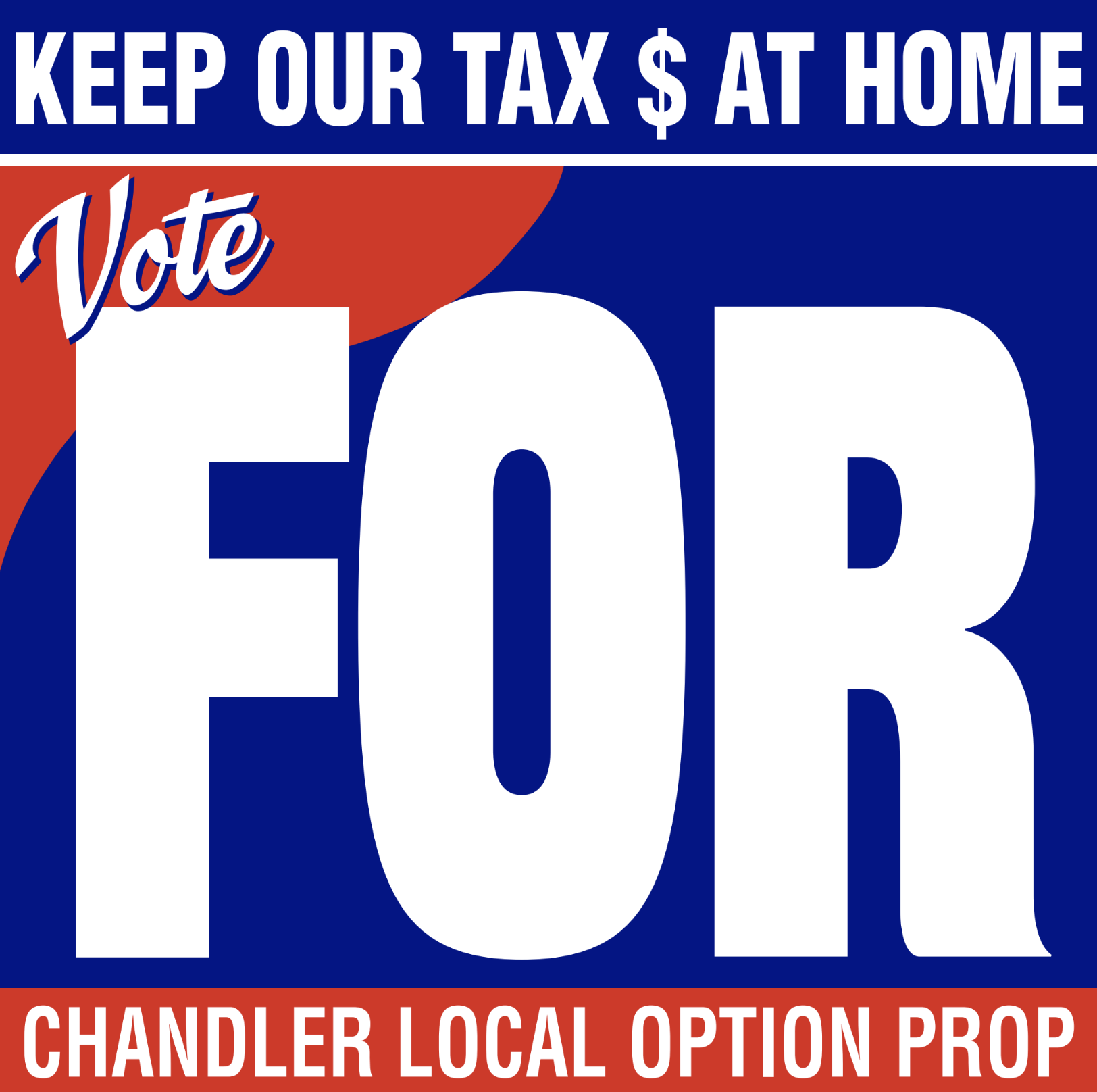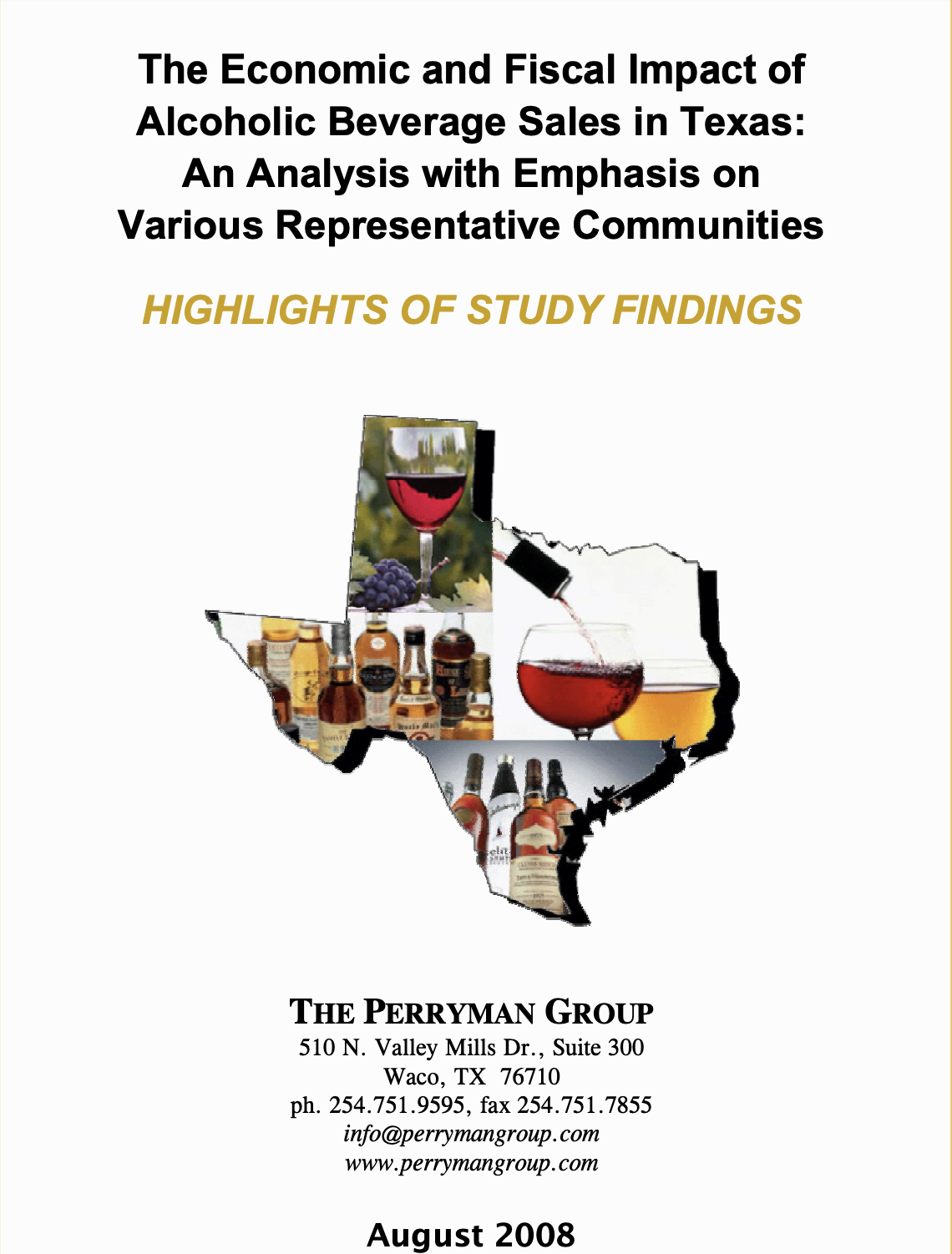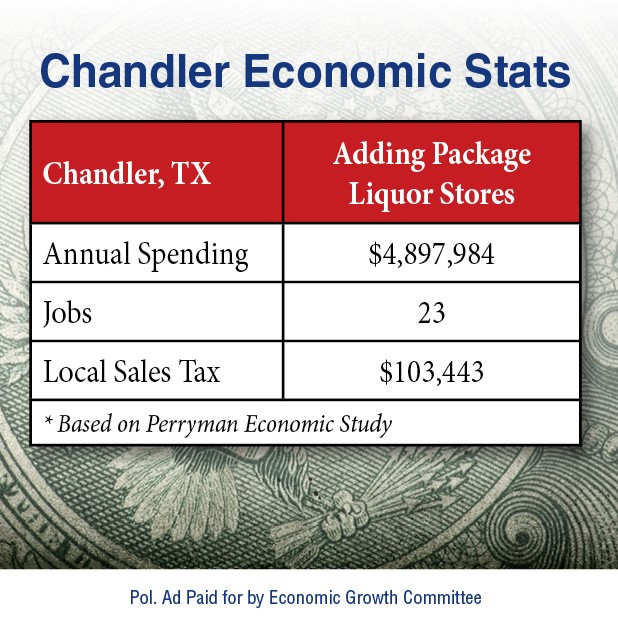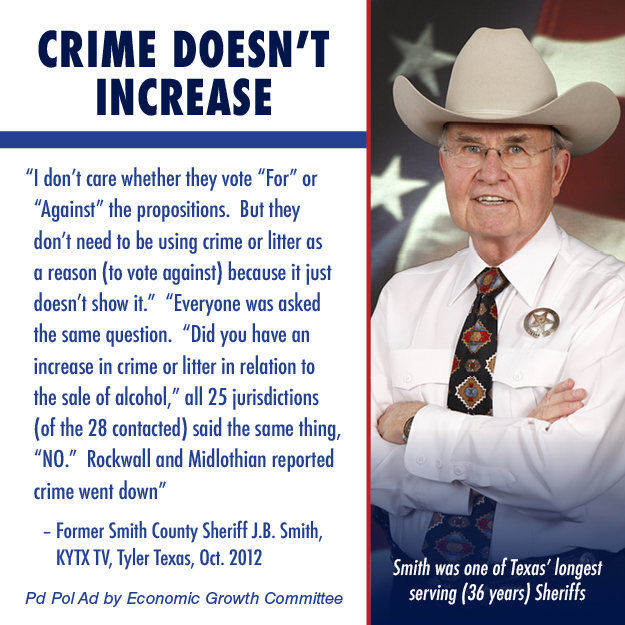
What The Opposition Doesn't Want You To Know
Opponents of local beer and wine sales argued that alcohol-related crime could increase, due to the easy availability of beer and wine. But Tyler Police Chief Gary Swindle said the opposite has happened. “It has, in fact, decreased crime,” he said. “People don’t have to drive as far to get their alcohol – they’re not running out to the county line in a hurry. So the roads are safer from intoxicated drivers.”
--Tyler Morning Telegraph 6.13.15
“There’s an increase in sales tax revenue coming into the community, and that’s very positive. And we just haven’t seen any negative effect, related to crime.”
--Gary Swindle, Tyler Police Chief (June 13, 2015)
“I don’t care whether they vote “For” or “Against” the propositions. But they don’t need to be using crime or litter as a reason (to vote against) because it just doesn’t show it.” “Everyone was asked the same question. “Did you have an increase in crime or litter in relation to the sale of alcohol,” all 25 jurisdictions (of the 28 contacted) said the same thing, “NO.” Rockwall and Midlothian reported crime went down”
--Former Smith County Sheriff J.B. Smith, KYTX TV, Tyler Texas, Oct. 2012
(Smith was one of Texas’ longest serving (36 years) Sheriffs)
"We had an election last November (2013) in Nash. Our sales tax is up 66%--almost $200,000 so far this year. We have had no increase in crime or litter and we just lowered property taxes for our citizens, thanks to the increase in revenue from beer and wine sales.
--Doug Bowers, Nash City Manager (fmr. Tx Police Chief), Oct. 2014
(Update: Actual increase was $309,000 for 2015)
Tyler Alcohol Crashes Down 20% -- DUI’s down 33%
“According to data from the Tyler Police Department alcohol-related crashes have gone down. In 2012, before the election, there were 141, then in 2013, the year after the election, there were 113. DUIs have also dropped. There were 369 in 2012, but in 2013 there were 247 DUIs in Tyler.”
--KLTV Television, Tyler Texas May 5, 2014
From 2003 to 2016, while Texas gained over 5.8 million in population and over 533 communities approved local alcohol sales, the number of alcohol related highway fatalities decreased 5% over the number of fatalities in 2003.
Source: Data compiled from information from the Texas Alcoholic Beverage
Commission, the National Highway Traffic Safety Administration and U.S. Census Bureau
“Remember one year ago when a portion of the Lubbock community thought Lubbock
would be in ruins if it went wet? One year later we’re still standing. In fact, DWIs are
actually down and crime statistics haven’t shown a major jump.”
--Lubbock Avalanche Journal, Editorial, One Year Later, 10-24-2010
“Alcohol Sales didn’t bring ill-effects opponents feared
Duncanville, DeSoto & Lewisville going ‘wet’. . .
“All report no increase in crime”
Dallas Morning News (2010)
“An election has no effect on determining ‘if’ people consume alcohol in your town. In a few minutes, people can now quite easily travel from one place to another to purchase alcohol. You are already paying the social costs of alcohol consumption; the question is are you going to vote to realize the economic gain as well?”
–Dr. Ray Perryman
Spring 2009, Lubbock Press Conference
"Our crime rate dealing with alcohol-related offenses has either stayed static or gone down slightly. All of our other crime rates that deal with family violence have stayed static or gone down slightly. Talking to police chiefs over the years who have gone through this before, this is normal course of events. It doesn't create the big increase in crime that people think it will."
—Jacksonville Police Chief Reece McDaniel, Feb. 2012
SAFER ROADS AND HIGHWAYS Part II
“Over the past five years, Texas counties that are completely dry have had more than three times the number of alcohol-related traffic deaths per capita than counties that are completely wet.”
--October 29,2006. Study conducted by Lufkin Daily News as reported in article, “Statistics show alcohol-related deaths don't play favorites with wet/dry issue” by Hina Alam.
Cisco—DWI’s down
“The number of DWI’s in Cisco has dropped by 71% since our election in 2012. Clearly the claim that alcohol sales would increase accidents and DWI’s did not come true.”
---Cisco Police Chief Larry Weikel, 2015
“Overall, we really haven’t seen an increase in anything related to the alcohol in any way.”
--Jacksonville Asst. Police Chief John Page
Tyler Morning Telegraph, October 19, 2011
“Mineola Police Chief Chuck Bittner echoed. . .saying he also hasn’t seen a difference in crime in Mineola since voters approved alcohol sales.”
--Tyler Morning Telegraph, October 19, 2011
"So far we have not had the major problems that they were projecting for us. We have not really felt an impact from a crime point... everything has remained basically stable."
Plainview Police Chief, William Mull, Lubbock Avalanche Journal, April 26, 2009
“From a police officers' perspective, going wet pretty much made no noticeable difference to our job. There was no statistical difference in our alcohol-related crimes."
Lufkin Police Dept. Lt. David Young , Lubbock Avalanche Journal, April 26, 2009
"Crime is about the same, we haven't really seen an increase or decrease in crime. Everything has been steady."
Littlefield Police Lt. Tony Mendez, Lubbock Avalanche Journal, April 26, 2009
“We’ve hardly seen it affect us at all. There’s no increase in public intoxications or DWIs, and we haven’t seen any increase across the board.”
Rusk Police Chief Joe Evans, Cherokeean Herald, Oct. 14, 2009
Fewer Alcohol Accidents
Chief Joe Evans said the availability of beer and wine has helped cut down on the number of alcohol-related incidents. "I think part of it is the fact that they don't have to drive to get their alcohol. Instead of driving 20, 30, 40 miles to get alcohol, it's convenient because they stop by their local store and do their drinking in the house."
--Rusk Police Chief, Joe Evans, Tyler Morning Telegraph, 2012
The citizens of Lufkin and Angelina County voted to legalize alcohol sales in November 2006. The Lufkin Police Department did a comparison of the number of DWI arrests in 2006 to the same period in 2007and the number of DWI arrests dropped 11%--after alcohol sales were legalized.
--Information obtained from the Lufkin Police Department, Public
Information Officer, October 2007
In a story that appeared in an Arlington, Texas, newspaper a MADD representative admitted that their research has found no appreciable change in the rate of alcohol related accidents after other cities had approved alcohol sales and that is why the organization had taken no position on the decision to sell alcoholic beverages.
(Reported in the UTA Shorthorn, January 28, 2005, story regarding the
upcoming beer and wine election in Arlington)
The sale of alcohol may actually decrease expected accidents. . . Apparently, the effect on alcohol related accidents of consumers driving shorter distances more than offsets the effect of any increase in consumption . . .access to alcohol is estimated to reduce the expected number of annual accidents by a substantial and statistically significant decrease from the average (number of accidents) per year.
Source: Slippery when wet: The Effects of Local Alcohol Access
“Over the past five years, Texas counties that are completely dry have had more than three times the number of alcohol-related traffic deaths per capita than counties that are completely wet.”
--October 29,2006. Study conducted by Lufkin Daily News as reported in article, “Statistics show alcohol-related deaths don't play favorites with wet/dry issue” by Hina Alam.
Cisco—DWI’s down
“The number of DWI’s in Cisco has dropped by 71% since our election in 2012. Clearly the claim that alcohol sales would increase accidents and DWI’s did not come true.”
---Cisco Police Chief Larry Weikel, 2015
“Overall, we really haven’t seen an increase in anything related to the alcohol in any way.”
--Jacksonville Asst. Police Chief John Page
Tyler Morning Telegraph, October 19, 2011
“Mineola Police Chief Chuck Bittner echoed. . .saying he also hasn’t seen a difference in crime in Mineola since voters approved alcohol sales.”
--Tyler Morning Telegraph, October 19, 2011
"So far we have not had the major problems that they were projecting for us. We have not really felt an impact from a crime point... everything has remained basically stable."
Plainview Police Chief, William Mull, Lubbock Avalanche Journal, April 26, 2009
“From a police officers' perspective, going wet pretty much made no noticeable difference to our job. There was no statistical difference in our alcohol-related crimes."
Lufkin Police Dept. Lt. David Young , Lubbock Avalanche Journal, April 26, 2009
"Crime is about the same, we haven't really seen an increase or decrease in crime. Everything has been steady."
Littlefield Police Lt. Tony Mendez, Lubbock Avalanche Journal, April 26, 2009
“We’ve hardly seen it affect us at all. There’s no increase in public intoxications or DWIs, and we haven’t seen any increase across the board.”
Rusk Police Chief Joe Evans, Cherokeean Herald, Oct. 14, 2009
Fewer Alcohol Accidents
Chief Joe Evans said the availability of beer and wine has helped cut down on the number of alcohol-related incidents. "I think part of it is the fact that they don't have to drive to get their alcohol. Instead of driving 20, 30, 40 miles to get alcohol, it's convenient because they stop by their local store and do their drinking in the house."
--Rusk Police Chief, Joe Evans, Tyler Morning Telegraph, 2012
The citizens of Lufkin and Angelina County voted to legalize alcohol sales in November 2006. The Lufkin Police Department did a comparison of the number of DWI arrests in 2006 to the same period in 2007and the number of DWI arrests dropped 11%--after alcohol sales were legalized.
--Information obtained from the Lufkin Police Department, Public
Information Officer, October 2007
In a story that appeared in an Arlington, Texas, newspaper a MADD representative admitted that their research has found no appreciable change in the rate of alcohol related accidents after other cities had approved alcohol sales and that is why the organization had taken no position on the decision to sell alcoholic beverages.
(Reported in the UTA Shorthorn, January 28, 2005, story regarding the upcoming beer and wine election in Arlington)
The sale of alcohol may actually decrease expected accidents. . . Apparently, the effect on alcohol related accidents of consumers driving shorter distances more than offsets the effect of any increase in consumption . . .access to alcohol is estimated to reduce the expected number of annual accidents by a substantial and statistically significant decrease from the average (number of accidents) per year.
Source: Slippery when wet: The Effects of Local Alcohol Access
Laws on Highway Safety Bauhgman, Conlin, Dickert-Conlin, Pepper, May 29, 2001. Syracuse University and University of New Hampshire. A study of 65 Texas communities that changed their alcohol sales status between 1975-1996.
Laws on Highway Safety Bauhgman, Conlin, Dickert-Conlin, Pepper, May 29, 2001. Syracuse University and University of New Hampshire. A study of 65 Texas communities that changed their alcohol sales status between 1975-1996.
Seventeen years ago, voters overwhelmingly approved allowing beer and wine sales in our grocery stores and to eliminate the private club rules in our restaurants. The next year our sales tax grew nearly 28%, more than $5,000,000 additional tax dollars in part because we allowed people to shop locally.
--Lisa Hermes, President & CEO of the McKinney Chamber
Of Commerce (2023)
More than two years later, the numbers said beer and wine sales have been a big economic boon to Tyler. “What the numbers tell us is that a lot of Tyler money was going to support the outlying areas, as people drove out of the county to get beer and wine,” said former Mayor Barbara Bass, who was in office when the referendum passed. “Now all that tax money can be used here, for the services our community needs.”
--Tyler Morning Telegraph June 13, 2015
Most Proven Form of Economic Development
“For the last decade, one of the most proven economic generators for Texas communities has been changing the alcohol sales status through local option petitions and elections. Communities that have made these changes have seen millions in additional sales tax revenue, created thousands of jobs all without a single change in the tax rate and without having to grant any tax incentives.”
--George Kelemen, Texas Retailers Assn. President/CEO, 2018
Grocery Stores
“The Texas population is growing. With more than 500 Texas communities approving alcohol sales in the last 15 years, the fact is retail grocery stores have no need to locate in ‘dry’ areas, because they can easily build in an area that allows beer/wine sales. While the ability to sell beer and wine may not be the deciding factor in where to build a store, it absolutely becomes the deciding factor if competitors in neighboring towns can sell and you cannot. It is extremely hard for a ‘dry’ town to make the short list for any major grocery store in Texas.”
--George Kelemen, Texas Retailers Assn. President/CEO, 2018
Perryman on Louisiana vs Texas Comparisons
“When it comes to sales tax, economies are not always easily comparable. However, after so many elections in Texas we now have the ability to see what the sales tax revenues were both before and after the election and there is no doubt the sales tax revenues increased—in many cases far exceeding our predictions.
As for Louisiana and Texas comparison, I can confirm that Texas local jurisdictions (city and county)--only receive 2% of the total sale tax collected of 8.25%. But in Louisiana, the local jurisdictions receive between 5% to 6% of the total tax levied. On the whole it is a correct statement that Louisiana local jurisdictions will receive significantly more tax revenue than their Texas counterpart.”
--Dr. Ray Perryman, 2019
Perryman was right
There were strong economic arguments for approval. Economist Ray Perryman conducted an economic impact study, and reported that beer and wine sales could generate more than $100 million in new business activity, more than 1,600 jobs and almost $5 million in local tax revenue. Those expectations have been exceeded, according to city officials.
-Tyler Morning Telegraph (June 13, 2015)
The city estimates that sales tax revenues increased by $35,000 to $40,000 a month. That’s up to $440,000 a year, “I think a lot of people were surprised to see that,” former Mayor Bass said. “They were amazed at how much Tyler money was being spent outside of Tyler. But that additional revenue has allowed us to implement a lot of plans we developed during the economic downturn, plans that we had to put off.”
--Tyler Morning Telegraph (June 13, 2015)
“The alcoholic beverage industry is an important contributor to the state economy, supporting some $36.6 billion in total annual spending and more than 300,000 jobs. “
--Dr. Ray Perryman, October 8, 2008
( Based on study released October 8, 2008 by Texas Economist Dr. Ray Perryman)
“Just after Buda residents voted to permit beer and wine sales in grocery stores, HEB announced their intent to build a store in Buda. By allowing the sale of beer and wine we immediately leveled the playing field with neighboring communities trying to attract high-quality businesses to their communities. More importantly, the City of Buda was able to lower its property tax rate four years in a row after we voted “wet”, from .1777 to .1301—a 27% drop in taxes”
--Billy Gray, former Mayor of Buda
“Frisco has far exceeded the sales tax revenue we had projected at the time of our election in 2002. Additionally, sales have been good for businesses. One grocery store reports that for each $1 consumers spend on beer and wine, an additional $3 in grocery items are also purchased in that store.”
--Audie Adkins, President, Frisco Chamber of Commerce
“Grapevine has enjoyed the benefits of beer and wine tax revenues for nearly 15 years and has seen no correlation between its local availability and our crime rate. In fact, we continue to build a world-class city while maintaining a safe and secure environment for our residents and businesses. Things have never been better in Grapevine.”
--William Tate, Mayor of Grapevine
Rusk, Texas
“Rusk saw its sales tax revenue spike to $681,701 in 2010 from $613,782 the previous year (the year of the election).”
(Tyler Morning Telegraph, February 2012)
Jacksonville, Texas
“Records from the state of Texas show Jacksonville's sales tax numbers increased to about $3.3 million last year from $3.1 million in 2009.
(Tyler Morning Telegraph, February 2012)
Corsicana, Texas
“According to the Texas Comptroller, Corsicana’s sales tax went down three years in a row prior to voting wet in 2004. Since then our sales tax has gone up, $1.56 million –41%. Cities constantly need to bring good economic development, but Corsicana voting wet was the best economic development tool we could have done.”
--Jerry Jackson, Leader of Corsicana Effort in 2004
Texas Hospitality Association
For example, sales tax revenue increased 29.66 percent in the (38) cities that approved beverage alcohol sales in the Dallas-Forth Worth Metroplex. Sales taxes rose an anemic 1.12 percent in the six Metroplex cities that voted to stay "dry," which includes Cockrell Hill, Irving, Lancaster and Mesquite. (Texas Hospitality Association, 2012)
(Editors Note: And now all those cities have since voted ‘wet’).
Lowered Property Taxes
Many cities in Texas lowered their property taxes after approving beer and wine sales. Grapevine, Colleyville, Frisco, Temple and Buda are just a few examples of cities that were able to ease the burden on homeowners after they approved beer and wine sales in their communities.
--Source: City Secretaries in each respective City. --30
Pol. Ad Paid for by the Economic Growth Committee Political Action Committee. The Economic Growth Committee PAC was created in 2015 and filed with Texas Ethics Commission to support local option alcohol elections in the State of Texas.
The EGC PAC supports efforts across the State of Texas and is not affiliated with any local 4A or 4B economic development organization or chapter.”


